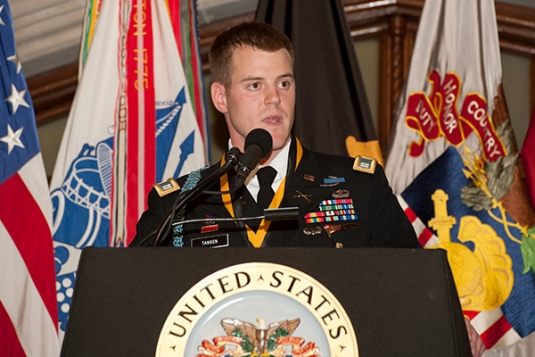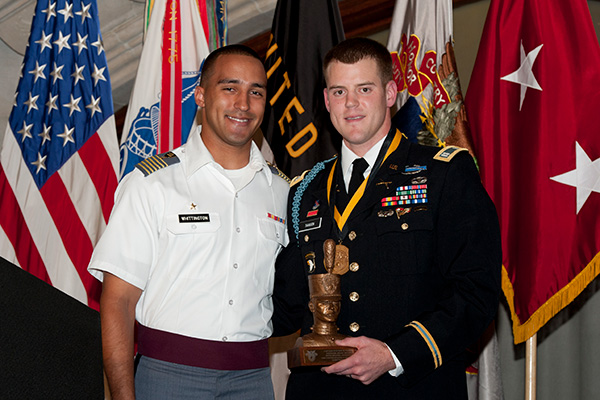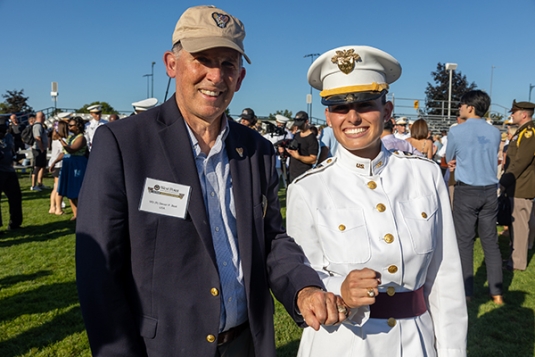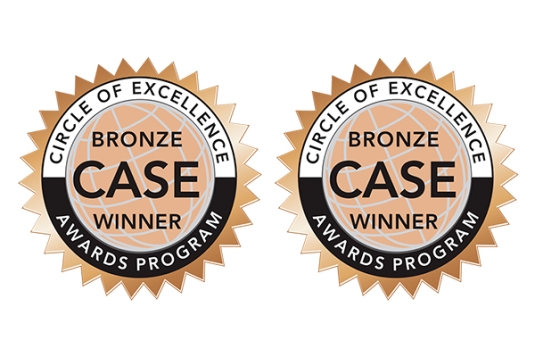Valor. n. “Courage and boldness, as in battle.” Valor is a concept the West Point community comprehends well. Many have lived it; all appreciate it. So when an officer receives an award with “valor” in the title, West Point understands the sacrifice behind the award.
Such is the case with Captain Stephen R. Tangen ’08, who the West Point Association of Graduates (WPAOG) presented with the 2012 Alexander R. Nininger Award for Valor at Arms for his actions as Platoon Leader of 1st Platoon, HHC, 2-327, 101st Airborne Division in Afghanistan on June 27, 2010. (Coincidentally, this is the same unit in which the 2009 Nininger recipient, First Lieutenant Nicholas Eslinger ’07, served, and Tangen’s first assignment was to take the lead of a rifle platoon from Eslinger). For 18 hours during one of the hottest days of the year in Afghanistan, then-Lieutenant Tangen placed himself in the line of devastating fire multiple times as he maneuvered his platoon, the spearhead of an assault through its objective area, against 250 or so Taliban insurgents.
Addressing the Corps of Cadets in Washington Hall, Tangen focused on three themes in his acceptance speech: 1) most choices are out of the junior officer’s hands, but one should embrace his or her “rendezvous with destiny” (the motto of the 101st), 2) recognize and appreciate the incredible soldiers you will lead (“your strength as a junior officer will come from the men and women serving around you”), and 3) remember the sacrifices of the fallen (“their names must never be forgotten”).
The Nininger Award is named for Second Lieutenant Alexander R. Nininger ’41, who fought the enemy to his death during the Battle of Bataan in January 1942 and posthumously received the first Medal of Honor in WWII, and the Nininger Award is endowed by E. Douglas Kenna ’45 and Jean Kenna. In addition to recognizing the recipient for his or her bravery as an individual, WPAOG regards the recipient as a given year’s representative for all West Point-commissioned officers who have heroically led soldiers in combat.
Speech
Good evening. Distinguished guests, and members of the Corps of Cadets.

Thank you for this honor. It is truly humbling to represent West Point’s combat leaders and to be associated with Lieutenant Nininger, a great soldier.
This evening I would like to tell you about two of my soldiers.
Their actions exemplify the best of those you will soon lead. In their stories, I hope you will find comfort and confidence.
However, before I tell you about them, I wanted you to know that my very first assignment was to receive the lead of a rifle platoon from First Lieutenant Nick Eslinger, Class of 2007. In 2009, Nick received the Nininger Award. In fact, three years ago, you Firsties heard him speak from this platform. Well, when I was a Yearling, Nick was my First Sergeant at Camp Buckner. Preparing these remarks, I kept thinking about the triple intersection of our paths. I also thought about the 101st Airborne Division’s motto: “Rendezvous with Destiny.”
In my first days as Nick’s successor, I vividly recall my NCO’s smirking as they declared: “Ya got big shoes to fill PL.” In fact, during the 12 months of training leading up to our deployment, my battle-hardened Soldiers, who had served with Nick, took special delight in needling me, saying “No pressure, PL” or “Whatcha gonna do now, PL?”
One of my purposes in telling you this story is to suggest that you all have some choice in creating your future. However, there will be surprises and there will be turns in the path that will be beyond your control. I have learned that how you respond to those turns—how you keep your focus on accomplishing the mission while taking care of your Soldiers—is a good measure of your character, shaped here at West Point. Trust me—those unexpected turns will come very soon after your graduation. You—and your Soldiers— will be ready. In a sense, that’s what service is all about, isn’t it?
Sometimes at those unforeseen moments, relationships formed here at West Point might reappear. Those moments will often be enriched by the unique humor and esprit de corps that is the essence of a tight unit. And when you meet fellow graduates, you will cherish memories created within these great halls. However, as you reminisce together, reserve a corner of your thoughts for the soldiers, and, possibly, your classmates who gave their lives for the liberties we enjoy here tonight.
Less than two years after Graduation Day, my battalion, the 2nd of the 327th Infantry Regiment, deployed to the Kunar Province, Afghanistan. There, we took part in the “clear, hold, build” strategy to route the Taliban from villages they repressed. My platoon participated in six battalion-sized air assault operations and countless patrols.
In our final mission, my battalion reconnaissance platoon was tasked to establish an attack-by-fire position on a ridgeline separating Taliban-controlled valleys that were two kilometers from Pakistan. Following a nighttime air insertion, my Platoon discovered a Taliban cave complex near the top of a ridge. There the enemy had hidden radio equipment used for command and control throughout the valleys. By force, we occupied the ridge, which was definitely key terrain to the enemy We held our positions for 10 days against repeated Taliban attacks, which exploited dense clouds, rain, and snow that obscured visibility on the cold, 9,000-foot ridgeline.
In the bad weather, attack helicopters could not fly and artillery was in demand throughout the battalion area. Consequently, my platoon’s survival depended on a single young Soldier and his 60 mm mortar tube.
Before the battle, Specialist Christopher Shaffer (he is now a sergeant), had distributed mortar rounds near the three points of our triangular patrol base. During attacks, as the Taliban maneuvered around us, Specialist Shaffer dashed between mortar firing points—alone—and under heavy machine gun fire. He repeatedly repelled the Taliban fighters who often moved within 100 meters of our perimeter. That’s about the distance from here to Washington Statue.
As thick snow blanketed our positions, and added insult to the bite of the below-freezing temperatures, my platoon would re-distribute mortar rounds. As we did, we noticed the empty cardboard mortar tubes scattered around Specialist Shaffer’s firing positions. The empty tubes were riddled with bullet holes from machine gun fire, and we realized that Specialist Shaffer knew how dangerous the situation was, but he never hesitated throughout the battle. He had protected our platoon’s dispersed elements, and would receive the Bronze Star for Valor for his heroic actions. To this day, when his fellow soldiers ask him how he avoided being shot, Chris just smiles and shrugs.
His example of courage and perseverance took place after nearly a year of our operations in Kunar. Ten months prior, shortly after arriving in Kunar Province, my rifle platoon—1st Platoon, Charlie Company—had participated in its first major operation. It was June and the mountain passes between Afghanistan and Pakistan had become trafficable, allowing Taliban to cross the border and conduct attacks. They were staging their strongest attacks from villages in the Ghaki Valley, which were under Taliban control.
Our mission was to clear the Ghaki Valley up to the known Taliban stronghold at Daridam. Early in the mission, we were operating on a section of the Ghaki Road that turned into a bottleneck. Nested in the ridgeline above the bottleneck, on the southern side of the road, was the only large tree in the area. That tree stood alone like a signal tower. In retrospect, I am sure it served as a target reference point for the Taliban.
The narrow point in the road was bounded on one side by a wall that dropped in 5 to 10 foot terraces, and on the right side by a ridgeline above a steep 15-foot vertical ascent. Our staggered column formation included elements from an Afghan National Army company. When the Afghan trail element reached the point marked by the tree, the insurgents attacked with RPGs and heavy machine guns, firing from two nearby villages. The RPGs hit between my platoon’s lead squad and the trail element of the Afghan company, which was directly underneath that large tree.
One Afghan soldier was killed immediately and another lost the lower portion of his leg as he was thrown several feet into the air. During the initial burst, Private Stephen Palu, my Bravo Team M240B gunner, received gunshot wounds to the left thigh and right arm.
Amidst the chaos, one of my squad leaders, Staff Sergeant Eric Shaw, deployed his men near the slain Afghan soldier. Then, SSG Shaw told his men that he would not leave them and that he would be right back. Next, he moved, by himself and under relentless fire, down the Ghaki Road to find the Afghan commander and help him move his pinned-down soldiers into covered positions. Still under fire, Eric then ran back to his squad and led them to the MRAP vehicles positioned on the road to the west of our position. Sergeant Shaw helped direct the vehicles forward to suppress the insurgents’ fortified firing points, and he continued to direct the Afghan soldiers, using hand signals and gestures to overcome the language barrier. At times, he physically guided them into covered positions.
Under the continuing machine gun and RPG fire, we advanced down the Ghaki Road, as Eric Shaw continued to aid the Afghan soldiers. At the limit of our advance, the Taliban fire intensified, and Sergeant Shaw dashed forward to collect up the last few Afghan soldiers, refusing to leave any of them unprotected. That’s when one round took his life. His actions—his courage and selflessness—exemplify the bond between soldiers. Notably, as did Lieutenant Alexander Nininger, Eric Shaw responded to the fundamental calling among soldiers who are fighting side-by-side, regardless of their nationality.
For me, the valor of these great Americans illustrates the character of our Nation’s Soldiers. You will lead many like them in the years ahead. When you do, draw strength from them. But also know that you are prepared. Together, you and your soldiers will persevere. You will overcome adversity. And, together, you will do what might seem impossible.
In closing, thank you to the United States Military Academy and the West Point Association of Graduates. Most of all, thanks to all of you in the Corps for blessing me with your presence and giving me this opportunity to tell part of the story of the courageous men and women of the No Slack Battalion, the Bastogne Brigade, 101st Airborne Division.




